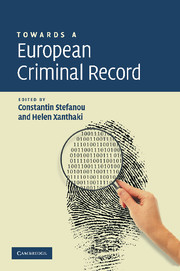Book contents
- Frontmatter
- Contents
- List of contributors
- Preface and acknowledgements
- 1 Introduction: How did the idea of a European Criminal Record come about?
- PART I
- PART II
- 5 The European Criminal Record in Austria
- 6 The European Criminal Record in the Czech Republic
- 7 The European Criminal Record in Germany
- 8 The European Criminal Record in Greece
- 9 The European Criminal Record in Hungary
- 10 The European Criminal Record in Ireland
- 11 The European Criminal Record in the Netherlands
- 12 The European Criminal Record in Slovenia
- 13 The European Criminal Record in Slovakia
- 14 The European Criminal Record in Spain
- 15 The European Criminal Record in England and Wales
- PART III
- 19 Conclusions
- Index
11 - The European Criminal Record in the Netherlands
Published online by Cambridge University Press: 13 July 2009
- Frontmatter
- Contents
- List of contributors
- Preface and acknowledgements
- 1 Introduction: How did the idea of a European Criminal Record come about?
- PART I
- PART II
- 5 The European Criminal Record in Austria
- 6 The European Criminal Record in the Czech Republic
- 7 The European Criminal Record in Germany
- 8 The European Criminal Record in Greece
- 9 The European Criminal Record in Hungary
- 10 The European Criminal Record in Ireland
- 11 The European Criminal Record in the Netherlands
- 12 The European Criminal Record in Slovenia
- 13 The European Criminal Record in Slovakia
- 14 The European Criminal Record in Spain
- 15 The European Criminal Record in England and Wales
- PART III
- 19 Conclusions
- Index
Summary
Introduction: The legal framework
In November 2002 the Dutch Act on Judicial and Prosecutorial Data (Wet justitiële en strafvorderlijke gegevens) was published in the Dutch Bulletin of Acts and Decrees (Staatsblad). The Act, which entered into force on 1 April 2004, replaced the 1955 Act on Judicial Documentation and the Certificate of Behaviour.
Although the Dutch regulation of criminal records is closely related to the Act on the Protection of Personal Data (Wet bescherming persoonsgegevens), the Act on Police Files (Wet politieregisters), the Act to Improve the Assessments of Integrity of Public Administration, which entered into force on 1 June 2003, and the Act on Records on Companies (Wet documentatie vennootschappen), which entered into force on 8 May 2003, this chapter restricts itself to a discussion of the Act on Judicial and Prosecutorial Data. I will discuss the way criminal data are defined and who has access to them. I will also describe the way Council Decision 2005/876/JHA of 21 November 2005 on the exchange of information extracted from the criminal record has been implemented by amending the Order on Criminal Data (Besluit justitiële gegevens).
As mentioned above, the Act on Judicial and Prosecutorial Data replaced the Act on Judicial Documentation and the Certificate of Behaviour. The Dutch government provided some reasons for replacing the Act on Criminal Records.
- Type
- Chapter
- Information
- Towards a European Criminal Record , pp. 211 - 225Publisher: Cambridge University PressPrint publication year: 2008



